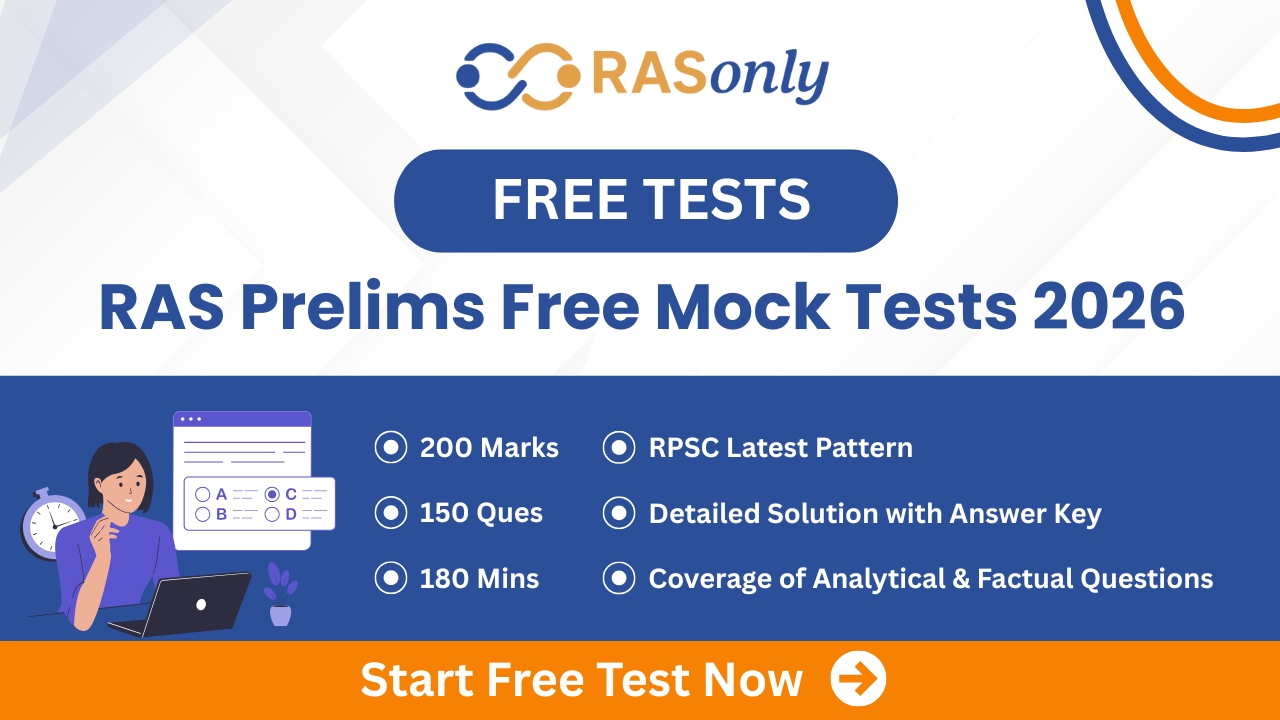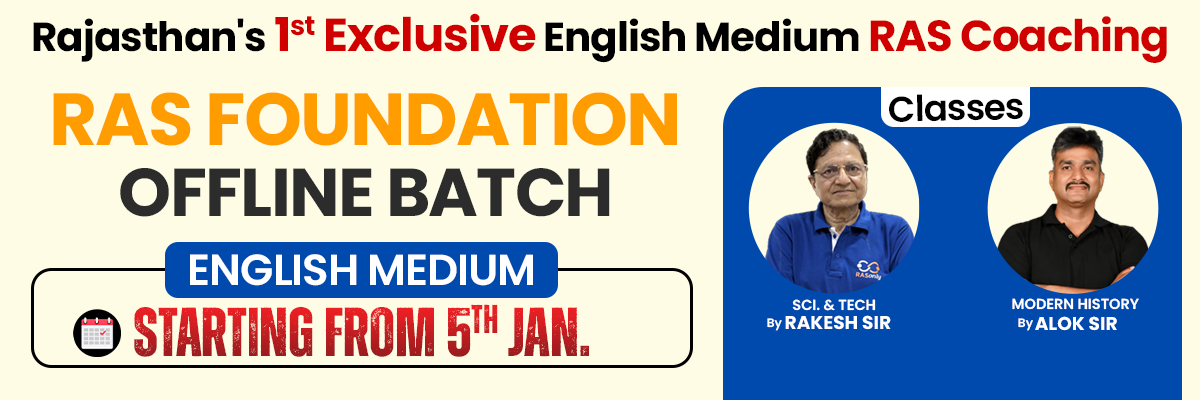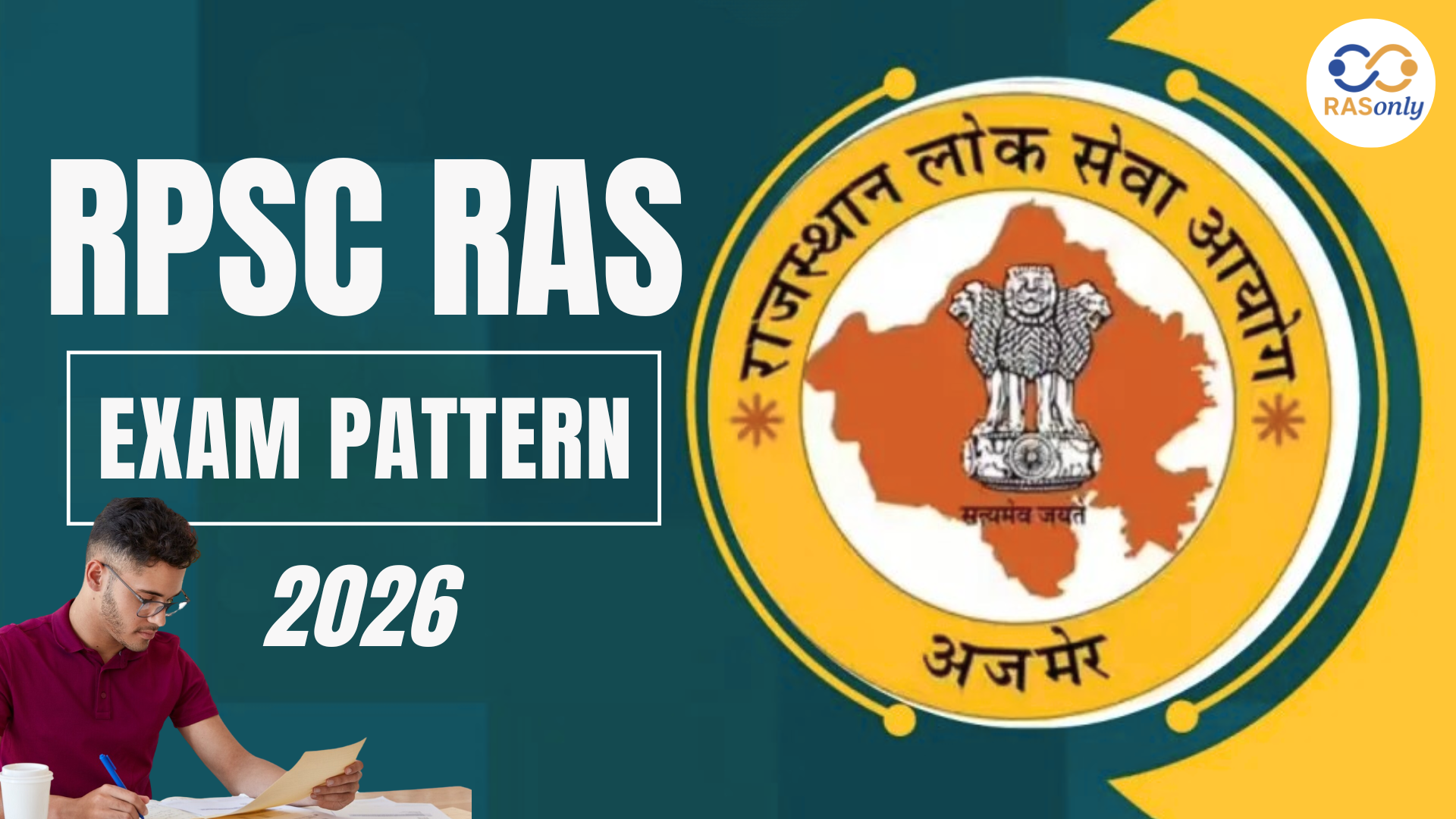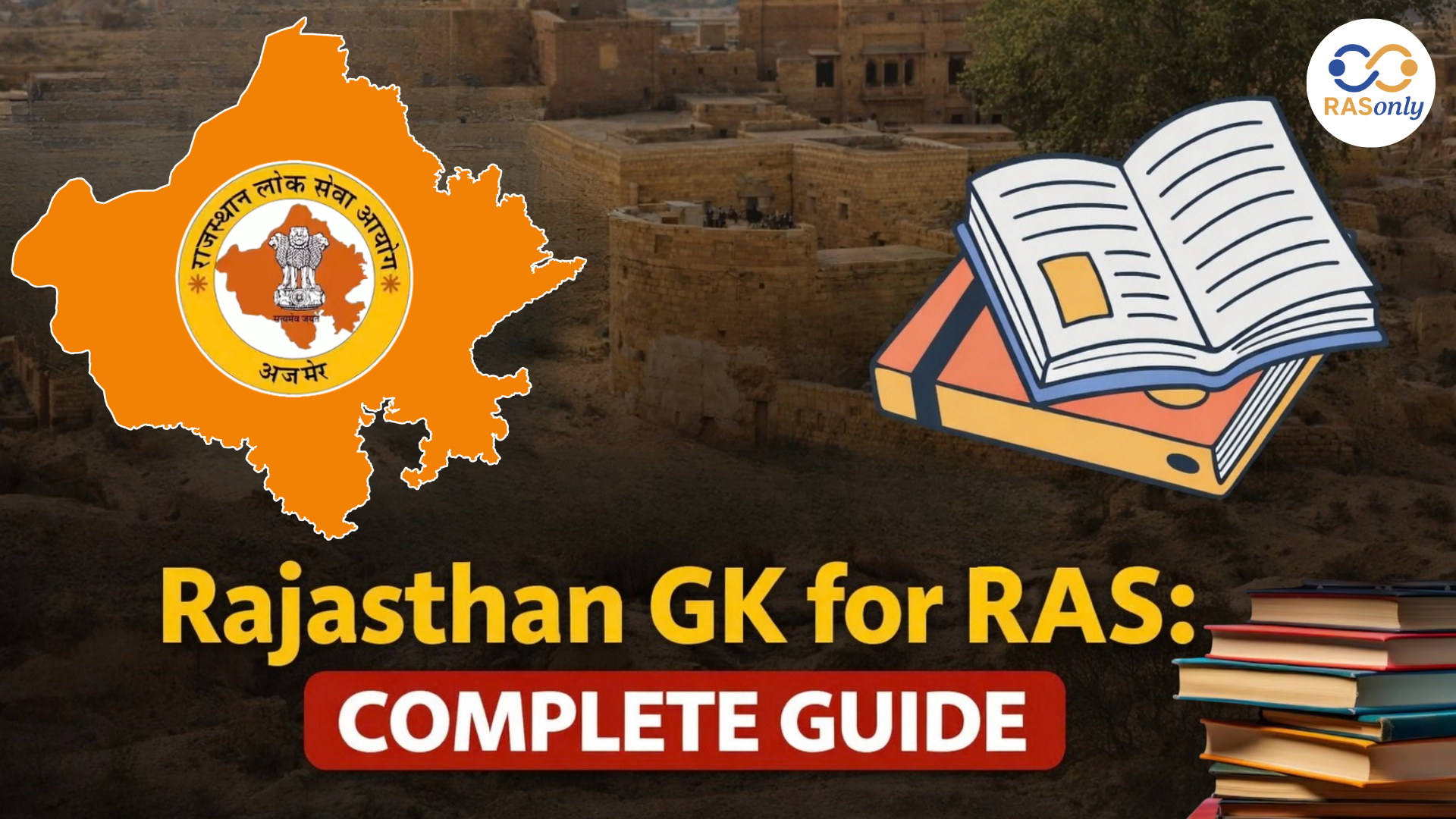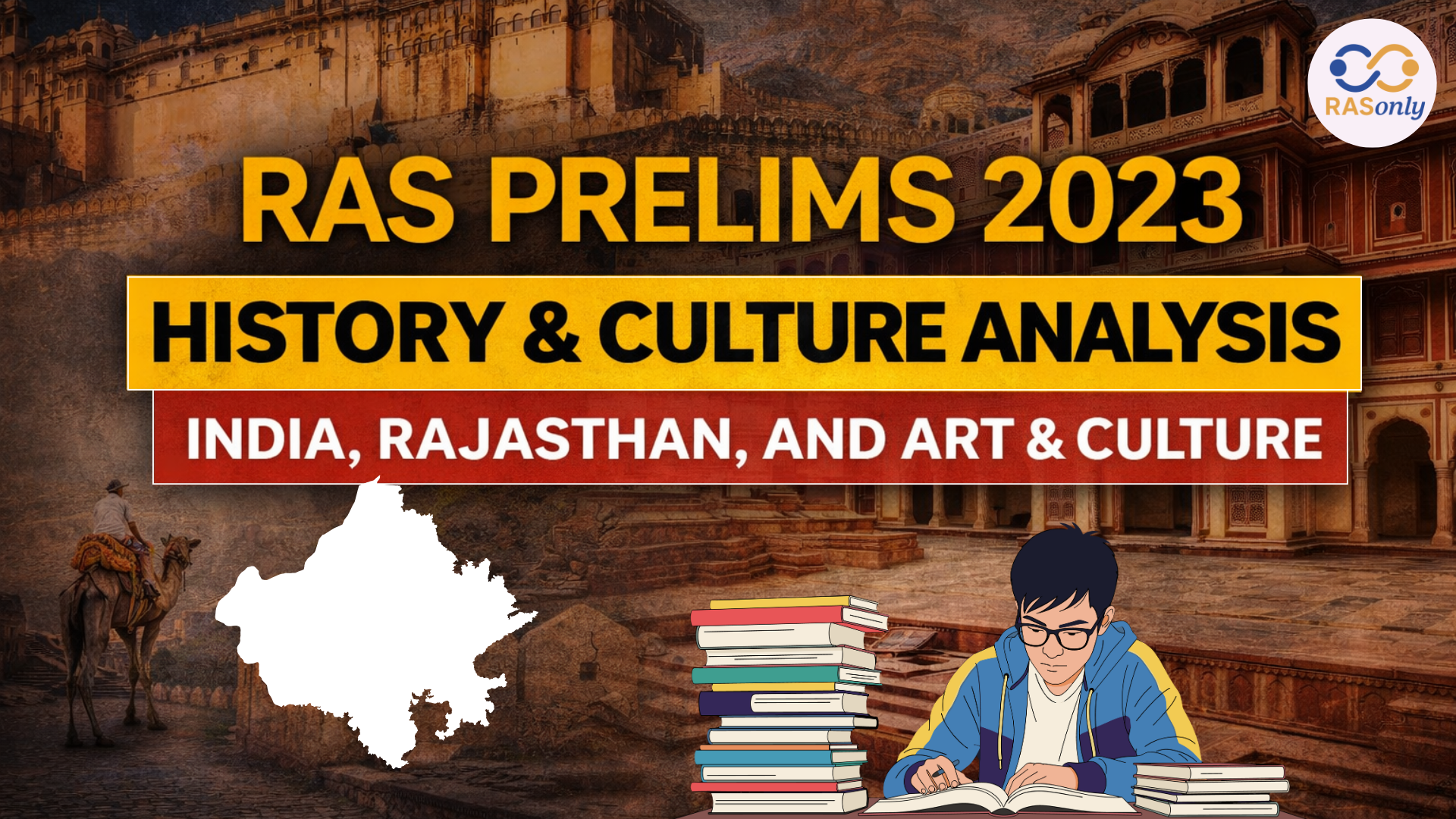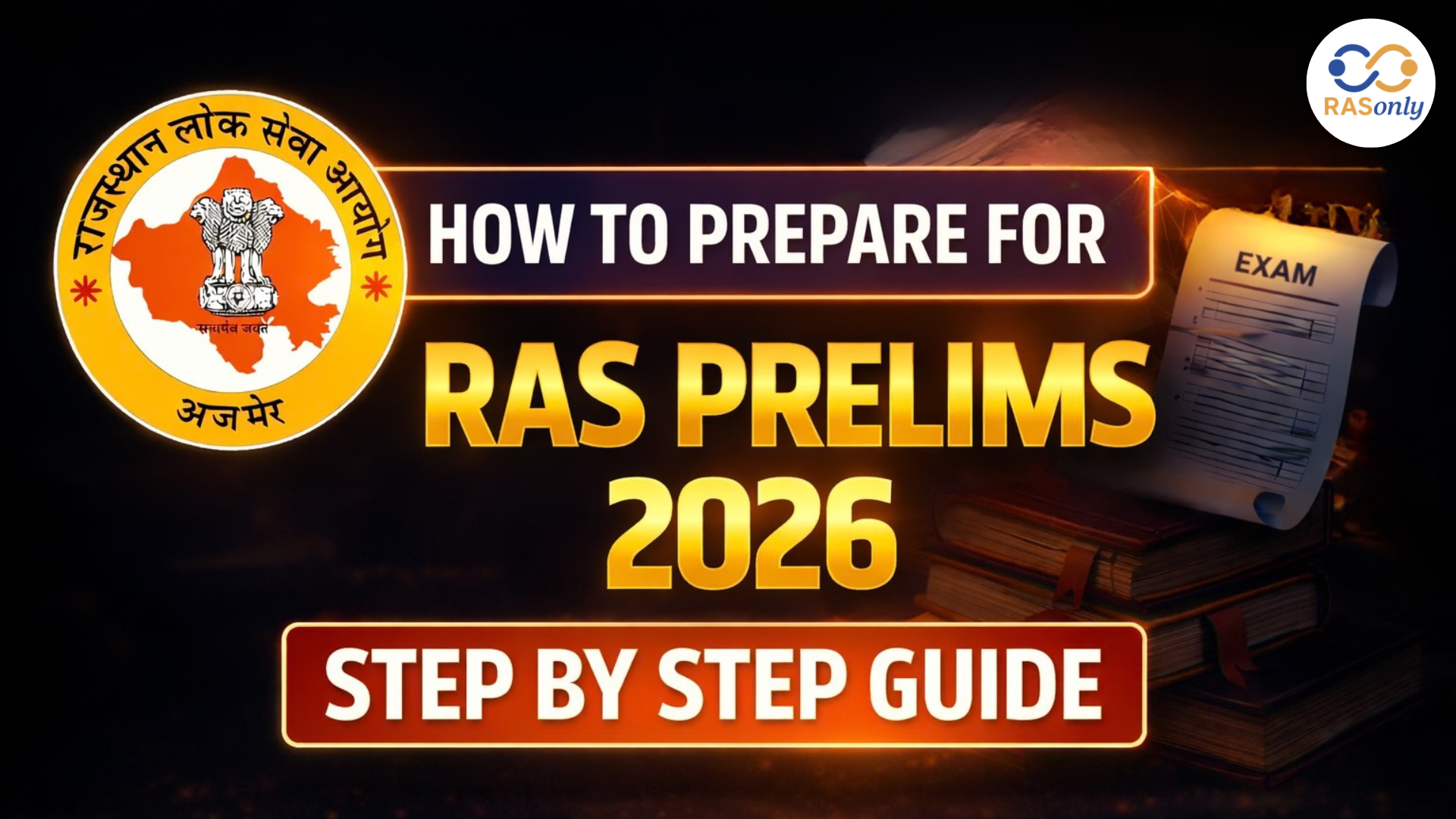RPSC RAS 2026 Subject Wise Exam Pattern for Prelims, Mains & Interview Details
- >
- Preparation Tips
- >
- GS Paper-Wise Strategy for RAS Mains
GS Paper-Wise Strategy for RAS Mains

Get in Touch with RASonly!

GS Paper-Wise Strategy for RAS Mains helps aspirants prepare each General Studies paper with clarity and direction. This guide explains paper-specific demands, Rajasthan-focused study areas, preparation methods, and answer writing priorities. It emphasizes conceptual understanding, current integration, and structured writing to maximize marks. Following a disciplined, paper-wise approach improves time management, reduces confusion, and enhances performance in the RAS Mains examination.

Studying to take the RAS Mains exam can be daunting particularly in General Studies. The curriculum is huge, the questions are analytical and the competition is stiff. The difference between a successful candidate and the rest is not merely in the case of hard work, but clever, paper-wise preparation. The GS Paper-Wise Strategy of RAS Mains is a blog that is aimed at assisting you to approach every General Studies paper in a clear, directed, and confident manner.
Instead of having to study all the papers at once a concentrated approach to each paper enables you to manage time, answer better and to prepare them in accordance to the demands of the actual exam.
The RAS Mains Structure of GS Papers.
RAS Mains is made of various General Studies papers, each of which examines various aspects of a candidate knowledge and aptitude. Although the paper structure may change a bit with time, the fundamental areas remain unchanged.
It is worth noting that RAS GS papers are not factual before getting into the preparation. Their testing is done on conceptual clarity, application, understanding of Rajasthan-specific issues, and how they can provide balanced answers within a word limit.
GS Paper-Wise Strategy Breakdown for RAS Mains
| GS Paper | Major Areas | What to Focus On | Preparation Approach | Answer Writing Priority |
|---|---|---|---|---|
| GS Paper I | History, Art & Culture, Geography | Rajasthan history, folk culture, physical & state geography | Conceptual clarity, maps, timelines, Rajasthan linkage | Maps, examples, structured flow |
| GS Paper II | Polity, Governance, Social Justice | Constitution, state administration, welfare schemes | Static + current integration, case examples | Articles, balanced views |
| GS Paper III | Economy, Environment, Science & Tech | Rajasthan economy, agriculture, biodiversity, applied science | Data-based study, selective coverage | Diagrams, current relevance |
| GS Paper IV | Ethics, Integrity, Aptitude | Ethical values, decision making, case studies | Concept understanding, practice-based learning | Logical reasoning, clarity |
GS Paper I Strategy (History, Culture, Geography)
What This Paper Demands
GS Paper I focuses heavily on History, Art and Culture, and Geography, with a strong emphasis on Rajasthan. Many aspirants underestimate this paper by relying only on static notes, but questions often demand interpretation and linkage with current relevance.
Preparation Approach
In the case of History, emphasize on Ancient, Medieval, and Modern India, though in any case, Rajasthan history must be in the limelight. Issues such as the freedom struggle in Rajasthan, regional movements, and local rulers are high scoring on the assumption that they are well prepared.
Visual memory assists in Art and Culture. Examples and features should be made ready of temples, folk dances, paintings, festivals, and architectural styles. Geography should be approached conceptually. Physical geography basics must be strong before moving to Rajasthan’s climate, soils, rivers, and resources.
Suggested Resource Mapping
| Area | Key Focus |
|---|---|
| History | Rajasthan history + Modern India |
| Culture | Folk arts, architecture, traditions |
| Geography | Physical + Rajasthan-specific |
After understanding the table above, it becomes clear that prioritizing Rajasthan-related content gives you an edge. National topics should always be linked back to the state wherever possible.
Answer Writing Tips
Use maps wherever relevant. Even simple hand-drawn maps can fetch extra marks. Structure answers with subheadings and include examples from Rajasthan to stand out.
GS Paper II Strategy (Polity, Governance, Social Justice)
What This Paper Demands
The GS Paper II examines your comprehension of the Indian Constitution, political system, governance system and social issues. Questions tend to be similar to the current affairs and, therefore, it is necessary to integrate.
Preparation Approach
Begin with the basics of the constitution, including fundamental rights, responsibilities and guiding principles. Next, change the aspect of governance, such as transparency, accountability, and e-governance, particularly the initiatives of Rajasthan.
The issues of social justice like education, health, empowering women, and unsatisfied sections, should be ready with the data, schemes and challenges.
Suggested Resource Mapping
| Area | Key Focus |
|---|---|
| Polity | Constitution, state government |
| Governance | Policies, administration |
| Social Justice | Welfare schemes, issues |
Once you go through the table, focus on updating static topics with current examples. For instance, link governance answers with recent administrative reforms or digital initiatives in Rajasthan.
Answer Writing Tips
Maintain neutrality and balance. Avoid extreme opinions. Use constitutional articles where relevant and conclude answers with practical solutions.
GS Paper III Strategy (Economy, Science, Technology, Environment)
What This Paper Demands
GS Paper III is dynamic and application-oriented. It evaluates your understanding of economic concepts, environmental issues, and scientific developments, again with a Rajasthan angle.
Preparation Approach
In the case of economy, the concepts of basic concern include growth, inflation, budgeting, and agriculture. The economy, industries, tourism and employment schemes of Rajasthan are something special to be noted.
The matters of environment, such as climate change, biodiversity and conservation, are gaining momentum. Rajasthan’s national parks, wildlife sanctuaries, and water conservation efforts should be prepared thoroughly.
Science and technology can be prepared selectively. Focus on applications rather than technical details.
Suggested Resource Mapping
| Area | Key Focus |
|---|---|
| Economy | State economy, agriculture |
| Environment | Conservation, climate |
| Science & Tech | Applied awareness |
This table highlights the need for selective study. Instead of covering everything in science, focus only on areas relevant to administration and society.
Answer Writing Tips
Use diagrams and flowcharts where possible. Support answers with recent data or examples. Avoid jargon and keep explanations simple.
GS Paper IV Strategy (Ethics, Integrity, Aptitude)
What This Paper Demands
GS Paper IV evaluates your ethical understanding, moral reasoning, and decision-making ability as a future administrator. This paper can be a game-changer if prepared sincerely.
Preparation Approach
Start with basic ethical concepts such as integrity, accountability, empathy, and objectivity. Use real-life examples, preferably related to administration or social life.
Case studies require practice. Learn to identify stakeholders, ethical dilemmas, and possible solutions in a structured manner.
Suggested Resource Mapping
| Area | Key Focus |
|---|---|
| Ethics | Values, thinkers |
| Aptitude | Decision making |
| Case Studies | Practical approach |
The table clearly shows that practice is as important as theory. Regular answer writing and discussion of case studies will improve clarity and confidence.
Answer Writing Tips
Be honest and practical. Avoid idealistic answers that are difficult to implement. Structure case study answers clearly with headings.
Importance of Answer Writing Practice
No GS Paper-Wise Strategy for RAS Mains is complete without answer writing. Reading alone will not translate into marks unless you practice expressing your knowledge effectively.
Write answers within the word limit. Focus on introductions and conclusions. Get your answers evaluated if possible and work on feedback consistently.
Revision Strategy for GS Papers
Revision should be planned alongside preparation. Create short notes for each paper. Use diagrams, keywords, and flowcharts. Revise Rajasthan-specific content more frequently, as it carries higher weightage.
The revision cycles should be weekly and monthly so that the information is retained and not stressed at the last moment.
Common Mistakes to Avoid
The mistake many applicants commit is that they treat RAS GS as other exams. The lack of attention to Rajasthan-oriented issues and the writing of answers, as well as excessive reliance on sources, may be detrimental.
Stick to limited resources. Revise multiple times. Write under examination conditions.
Conclusion
A well-crafted and well-organized GS Paper-Wise Strategy of RAS Mains can increase your chance to win considerably. The papers require slightly different approaches, yet the main ideas are identical: the clarity of the concept, the relevance of the paper to the state of Rajasthan, the frequent revision, and the constant writing of the answers.
Make yourself smart, be disciplined and believe in your preparation. RAS Mains is a goal that can be attained through a proper strategy and a long process.
FAQs
Post Category
- RAS Salary
- Result
- RAS Admit Card
- RAS Job
- RAS Cutoff
- Preparation Tips
- RAS Answer Key
- RAS Exam Analysis
- RAS Syllabus
- RAS Previous Year Papers
- RPSC RAS Exam Pattern
- RAS Interview
- RAS Mains Exam Date
- RAS Vacancy
- RAS Test Series
- RAS Best Books
- RAS Preparation Resources
- RAS Coaching Centre
- History
- Polity
- Geography
- Economics
- Science
- Art and Culture
- RPSC RAS Application Form
- RPSC RAS Notification
RASonly Interview Guidance Program

Mr. Ashok Jain
Ex-Chief Secretary Govt of Rajasthan
- IAS officer of the 1981 batch, Rajasthan cadre.
- Passionate about mentoring the next generation of RAS officers with real-world insights.
- Got retired in Dec 2017 from the post of Chief Secretary of the state of Rajasthan.

Mr. Guru Charan Rai
Ex-ASP / SP in Jaisalmer
- Guru Charan Rai, IPS (Retd), retired as Inspector General of Police (Security), Rajasthan, Jaipur in 2017.
- Served as ASP and SP in Jaisalmer, Nagaur, Sri Ganganagar, Sawai Madhopur, Dausa, Sikar, and Karauli.
- He also held key positions as DIGP and IGP in the Law and Order division.

Mr. Rakesh Verma
Ex-IAS Officer, B.Tech, MBA, and M.A. (Economics)
- IAS officer of the 1981 batch and retired in Chief Secretary Rank.
- Civil servant of high repute and vast experience.
- Has been teaching UPSC CSE subjects for the last six years.
Related Post
Daily Current Affairs for RAS Exam Preparation 2026
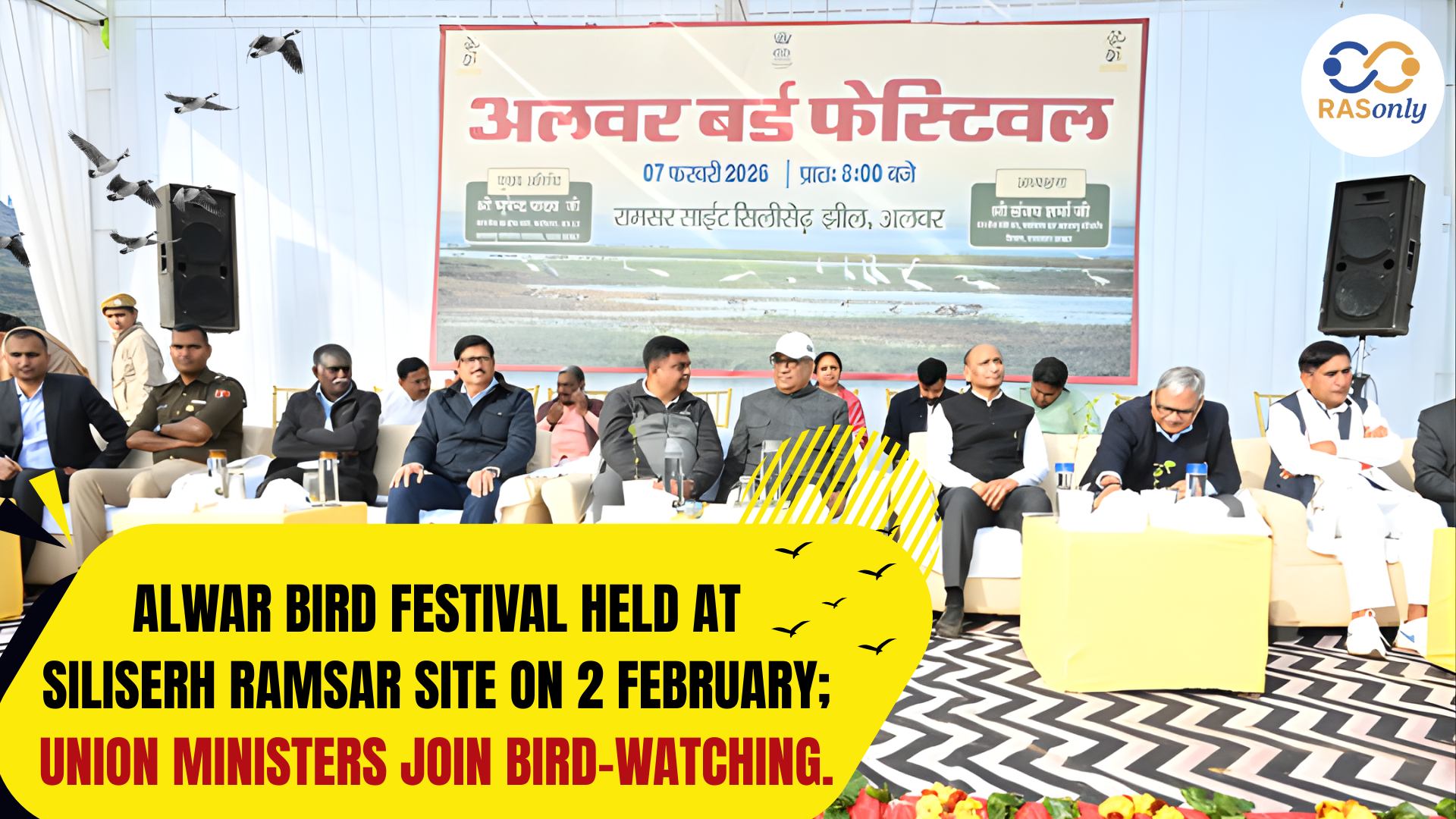
Alwar Bird Festival held at Siliserh Ramsar Site
February 09, 2026
Jaipur Architecture Festival 2026 concludes at JECC Sitapura
February 09, 2026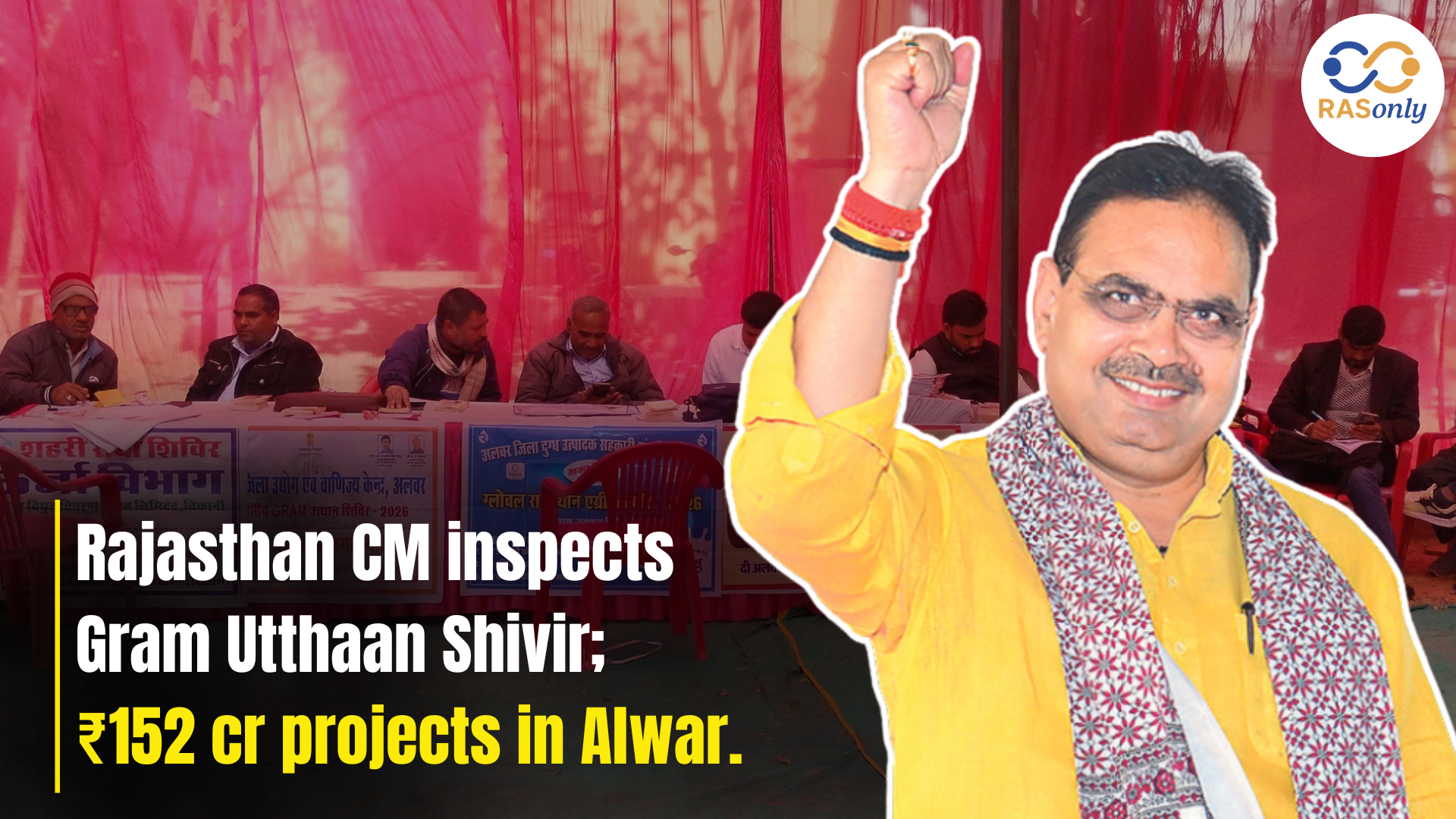
Rajasthan CM inspects Gram Utthaan Shivir in Ramgarh
February 09, 2026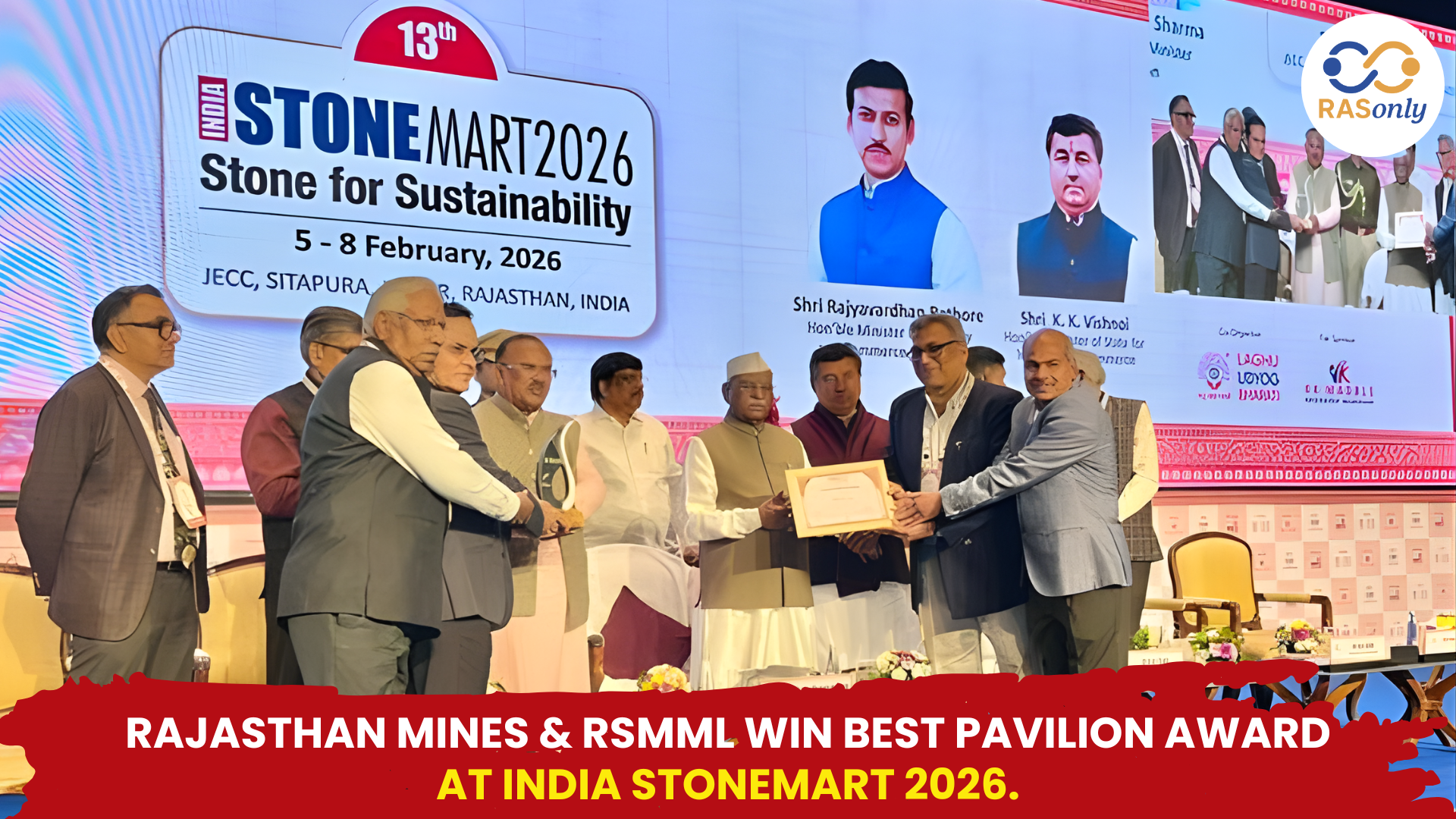
Rajasthan Mines & RSMML win Best Pavilion at India...
February 09, 2026👉🏻 Register Today to Join Classes! 👍🏻
- Team RASOnly -
🎯 Benefits of RASOnly Coaching:
- ✅ 1:1 Mentorship with RAS Officers
- ✅ Experienced and Expert Faculty
- ✅ Free Library Access
- ✅ Daily Minimum 4 Hours Must
- ✅ Comprehensive Study Material
- ✅ Regular Tests & Performance Analysis
- ✅ Personalized Guidance & Doubt Solving
- ✅ Online & Offline Class Options
- ✅ Affordable Fees with Quality Education
Key Highlights:
- 👉🏻 3-Day Refund Policy
- 👉🏻 New Batch Starting from 04 August
- 👉🏻 Registration Amount: Only ₹1000

